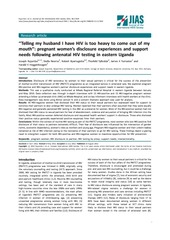| dc.contributor.author | Rujumba, Joseph | en_US |
| dc.contributor.author | Neema, Stella | en_US |
| dc.contributor.author | Byamugisha, Robert | en_US |
| dc.contributor.author | Tylleskär, Thorkild | en_US |
| dc.contributor.author | Tumwine, James K. | en_US |
| dc.contributor.author | Heggenhougen, Harald K. | en_US |
| dc.date.accessioned | 2013-01-18T10:46:11Z | |
| dc.date.available | 2013-01-18T10:46:11Z | |
| dc.date.issued | 2012-08-14 | eng |
| dc.Published | Journal of the International AIDS Society 2012, 15:17429 | eng |
| dc.identifier.issn | 1758-2652 | |
| dc.identifier.uri | https://hdl.handle.net/1956/6275 | |
| dc.description.abstract | Introduction: Disclosure of HIV serostatus by women to their sexual partners is critical for the success of the prevention of mother-to-child transmission of HIV (PMTCT) programme as an integrated service in antenatal care. We explored pregnant HIV-positive and HIV-negative women’s partner disclosure experiences and support needs in eastern Uganda. Methods: This was a qualitative study conducted at Mbale Regional Referral Hospital in eastern Uganda between January and May 2010. Data collection was through in-depth interviews with 15 HIV-positive and 15 HIV-negative pregnant women attending a follow up antenatal clinic (ANC) at Mbale Hospital, and six key informant interviews with health workers at the clinic. Data management was done using NVivo version 9, and a content thematic approach was used for analysis. Results: All HIV-negative women had disclosed their HIV status to their sexual partners but expressed need for support to convince their partners to also undergo HIV testing.Women reported that their partners often assumed that they were equally HIV-negative and generally perceived HIV testing in the ANC as a preserve for women. Most of the HIV-positive women had not disclosed their HIV status to sexual partners for fear of abandonment, violence and accusation of bringing HIV infection into the family. Most HIV-positive women deferred disclosure and requested health workers’ support in disclosure. Those who disclosed their positive status generally experienced positive responses from their partners. Conclusions: Within the context of routine HIV testing as part of the PMTCT programme, most women who test HIV-positive find disclosure of their status to partners extremely difficult. Their fear of disclosure was influenced by the intersection of gender norms, economic dependency, women’s roles as mothers and young age. Pregnant HIV-negative women and their unborn babies remained at risk of HIV infection owing to the resistance of their partners to go for HIV testing. These findings depict a glaring need to strengthen support for both HIV-positive and HIV-negative women to maximize opportunities for HIV prevention. | en_US |
| dc.language.iso | eng | eng |
| dc.publisher | BioMed Central | eng |
| dc.relation.ispartof | <a href="http://hdl.handle.net/1956/6277" target="blank">The Social Context of Prevention of Mother to Child Transmission of HIV (PMTCT) in Uganda</a> | eng |
| dc.rights | Attribution-NonCommercial CC BY-NC | eng |
| dc.rights.uri | http://creativecommons.org/licenses/by-nc/3.0/ | eng |
| dc.title | ‘‘Telling my husband I have HIV is too heavy to come out of my mouth’’: pregnant women’s disclosure experiences and support needs following antenatal HIV testing in eastern Uganda | en_US |
| dc.type | Peer reviewed | |
| dc.type | Journal article | |
| dc.description.version | publishedVersion | en_US |
| dc.rights.holder | Copyright 2012 Rujumba J et al; licensee International AIDS Society. | |
| dc.identifier.doi | https://doi.org/10.7448/ias.15.2.17429 | |
| dc.identifier.cristin | 974219 | |

